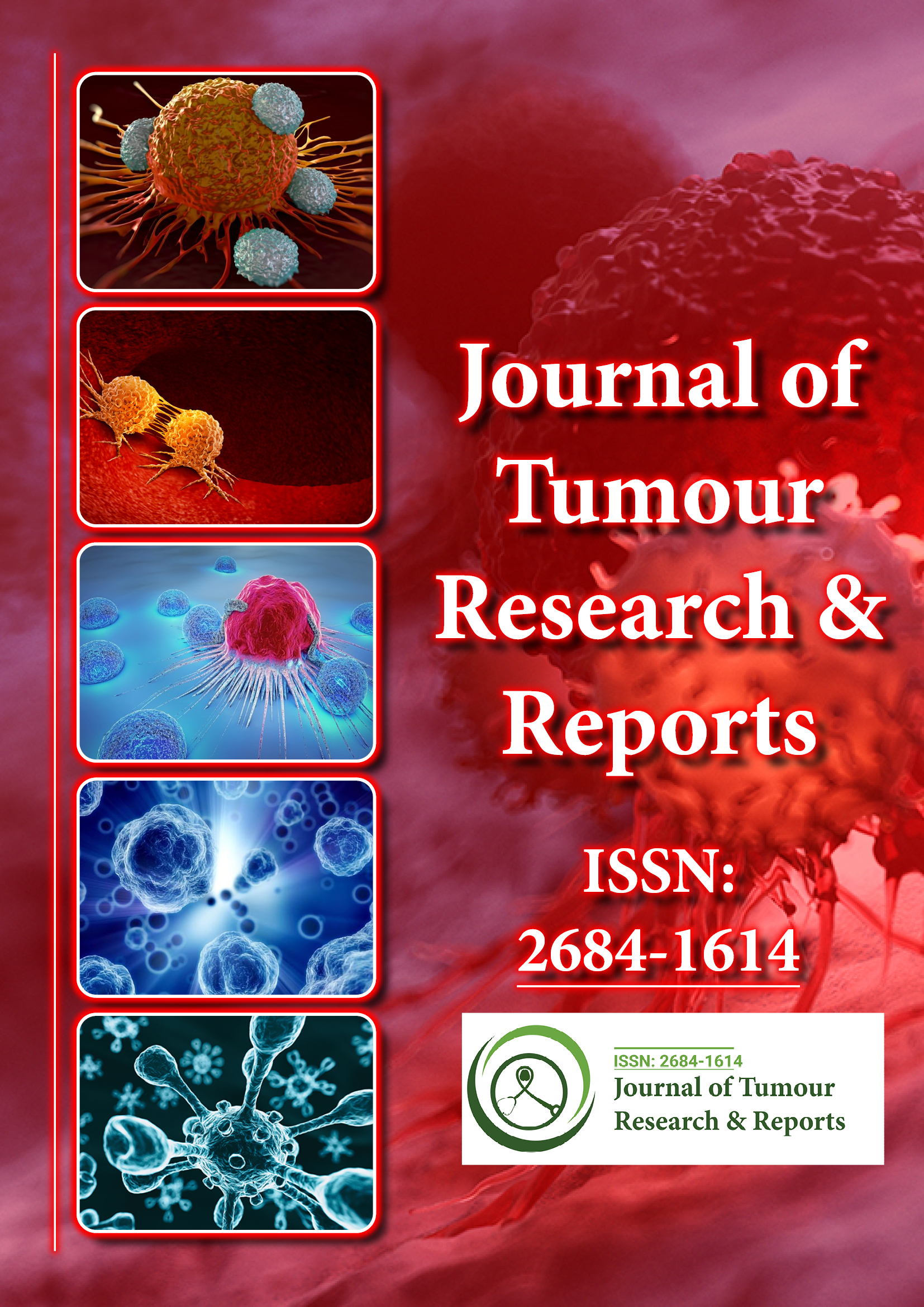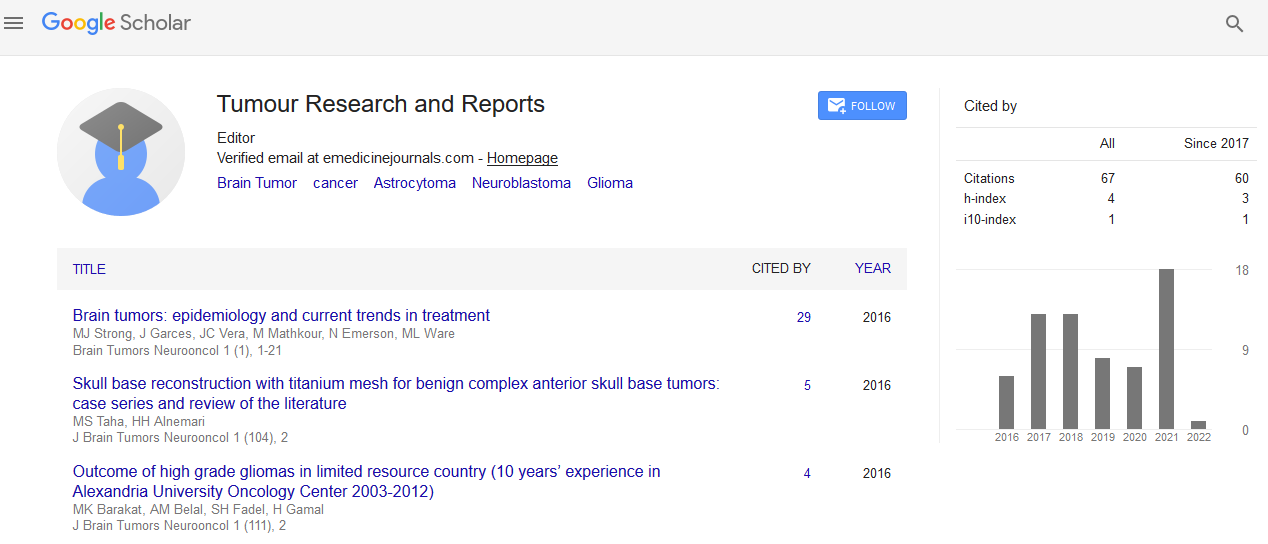Indexed In
- RefSeek
- Hamdard University
- EBSCO A-Z
- Google Scholar
Useful Links
Share This Page
Journal Flyer

Open Access Journals
- Agri and Aquaculture
- Biochemistry
- Bioinformatics & Systems Biology
- Business & Management
- Chemistry
- Clinical Sciences
- Engineering
- Food & Nutrition
- General Science
- Genetics & Molecular Biology
- Immunology & Microbiology
- Medical Sciences
- Neuroscience & Psychology
- Nursing & Health Care
- Pharmaceutical Sciences
Short Communication - (2025) Volume 10, Issue 1
The Emerging Role of Microbiota in Modulating Cancer Therapy Outcomes
Clara Mendes*Received: 03-Mar-2025, Manuscript No. JTRR-25-29021; Editor assigned: 05-Mar-2025, Pre QC No. JTRR-25-29021 (PQ); Reviewed: 19-Mar-2025, QC No. JTRR-25-29021; Revised: 26-Mar-2025, Manuscript No. JTRR-25-29021 (R); Published: 02-Apr-2025, DOI: 10.35248/2684-1614.25.10.253
Description
The human microbiota, a complex community of trillions of microorganisms residing primarily in the gut, has gained significant attention in recent years for its profound influence on health and disease. Beyond its established role in digestion, immunity, and metabolism, growing evidence suggests that the microbiota is a critical modulator of cancer development and response to therapy. This emerging axis between microbiota and oncology offers exciting opportunities to enhance cancer treatment efficacy, predict therapeutic response, and potentially reduce side effects. However, it also presents complex biological interactions that are only beginning to be understood [1].
Multiple studies have demonstrated that the gut microbiota can influence the effectiveness of chemotherapy, immunotherapy, and even radiotherapy. The mechanisms by which microbes exert these effects are diverse and multifactorial, involving direct interaction with drugs, modulation of host immune responses, and alteration of systemic inflammation. For example, certain bacterial species possess enzymatic activities that can activate or inactivate chemotherapeutic agents. An illustrative case is the microbial degradation of irinotecan into toxic metabolites by β- glucuronidase-producing bacteria, which contributes to severe gastrointestinal toxicity. Targeting such microbial enzymes using specific inhibitors has been proposed to mitigate these adverse effects without compromising antitumor efficacy.
The most striking discoveries in recent years relate to the microbiota's impact on Immune Checkpoint Inhibitors (ICIs), particularly therapies targeting PD-1 and CTLA-4. Preclinical mouse models have shown that antibiotic treatment or germ-free conditions, which deplete commensal bacteria, lead to impaired responses to ICIs. Conversely, the presence of specific bacteria such as Bifidobacterium, Akkermansia muciniphila, and Faecalibacterium prausnitzii has been correlated with enhanced antitumor immune responses and improved survival in cancer patients receiving immunotherapy.
Mechanistically, beneficial microbes appear to prime the immune system by enhancing antigen presentation, promoting T-cell infiltration into tumors, and upregulating proinflammatory cytokines. Akkermansia muciniphila, for instance, has been shown to restore response to PD-1 blockade in antibiotic-treated mice by inducing IL-12 production from dendritic cells, thereby boosting cytotoxic T-cell activity. Human studies have corroborated these findings, with fecal microbiota composition emerging as a potential biomarker for predicting immunotherapy response. Clinical trials are now underway to evaluate Fecal Microbiota Transplantation (FMT) as a strategy to restore or improve responsiveness to ICIs in refractory patients [2-4].
Diet and lifestyle, which strongly influence microbial diversity, also indirectly affect cancer outcomes. High-fiber diets, for example, promote the growth of butyrate-producing bacteria that exert anti-inflammatory and antitumor effects. On the other hand, Western-style diets rich in fats and processed foods can lead to dysbiosis, a state of microbial imbalance associated with chronic inflammation and carcinogenesis. Obesity-related dysbiosis has been linked to reduced efficacy of immunotherapy and increased tumor progression in certain cancers.
The interaction between the microbiota and cancer is bidirectional. While microbes influence therapy outcomes, cancer treatments themselves can alter the composition and function of the microbiota. Chemotherapy and radiation often lead to a reduction in microbial diversity, which may increase susceptibility to infections and gastrointestinal toxicity. Immune-related Adverse Events (irAEs), a common side effect of ICIs, have also been associated with shifts in gut microbial communities. Understanding these dynamics could inform prophylactic interventions aimed at maintaining or restoring a healthy microbiota during treatment [5-7].
Beyond the gut, microbiota at other body sites such as the oral, lung, and vaginal microbiomes are also being investigated for their roles in site-specific cancers. For instance, the lung microbiota may influence the development and progression of lung cancer, while alterations in the oral microbiome have been associated with head and neck cancers. These niches may serve as additional sources of predictive or prognostic biomarkers and offer novel targets for therapeutic modulation.
Efforts to modulate the microbiota for therapeutic benefit include the use of prebiotics, probiotics, synbiotics, antibiotics, and dietary interventions. Probiotic supplementation with strains such as Lactobacillus and Bifidobacterium has shown promise in reducing chemotherapy-induced mucositis and diarrhea, though more data are needed regarding their impact on long-term cancer outcomes. Prebiotics, non-digestible fibers that stimulate beneficial bacteria, may also enhance treatment efficacy when combined with ICIs.
Fecal Microbiota Transplantation (FMT), a more direct method of microbial modulation, has entered clinical trials in oncology. Preliminary results from small studies suggest that transferring microbiota from ICI responders into non-responders can improve therapeutic outcomes. However, challenges such as donor selection, standardization of protocols, and regulatory concerns remain before this can become mainstream practice [8-10].
References
- Palma G, Bruzzese F, Meo C, de Nigris F. Raf kinase inhibitor protein modulator of gut microbiota and immunotherapy responses in cancer. Biochimica et Biophysica Acta (BBA)-Reviews on Cancer. 2025:189364.
- Bai X, Liu B, Fan D, Lu Y, Zhao X. Modulating the gut microbiota: A novel perspective in colorectal cancer treatment. Cancer Lett. 2025:217459.
- Ma S, Yao H, Si X, Huang Z, Wang R, Wan R, et al. Orally available dextran-aspirin nanomedicine modulates gut inflammation and microbiota homeostasis for primary colorectal cancer therapy. J Control Release. 2024;370:528-542.
- Yu P, Xu W, Li Y, Xie Z, Shao S, Liu J, et al. Ginsenosides 20R-Rg3 and Rg5 enriched black ginseng inhibits colorectal cancer tumor growth by activating the Akt/Bax/caspase-3 pathway and modulating gut microbiota in mice. Curr Res Food Sci. 2025:100978.
- Cai J, Zhang W, Zhu S, Lin T, Mao R, Wu N, et al. Gut and Intratumoral microbiota: Key to lung Cancer development and immunotherapy. Int Immunopharmacol. 2025;156:114677.
- Zhou Y, Zhou X, Zhu X, Xu F, Li F. Mechanical cues shaping cancer cell-microbiota interaction dynamics in tumor progression. Cell Rep Phys Sci. 2025.
- Han Q, Li J, Li Z, Aishajiang R, Yu D. Novel therapeutic strategies and recent advances in gut microbiota synergy with nanotechnology for colorectal cancer treatment. Mater Today Bio. 2025;31:101601.
- Laaraj J, Lachance G, Bergeron A, Fradet Y, Robitaille K, Fradet V. New insights into gut microbiota–prostate cancer crosstalk. Trends Mol Med. 2025.
- Qian X, Chen Z, Ji XM, Ji YL, Wang J, Liu YC, et al. Qingfei mixture modulates the immune responses in lung cancer through modulating mTOR signaling and gut microbiota-derived short-chain fatty acids. Heliyon. 2024;10(8).
- Ciernikova S, Sevcikova A, Drgona L, Mego M. Modulating the gut microbiota by probiotics, prebiotics, postbiotics, and fecal microbiota transplantation: An emerging trend in cancer patient care. Biochim Biophys Acta Rev Cancer. 2023;1878(6):188990.
Citation: Mendes C (2025). The Emerging Role of Microbiota in Modulating Cancer Therapy Outcomes. J Tum Res Reports. 10:253.
Copyright: © 2025 Mendes C. This is an open-access article distributed under the terms of the Creative Commons Attribution License, which permits unrestricted use, distribution, and reproduction in any medium, provided the original author and source are credited.

